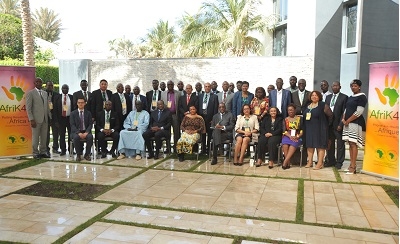
Dakar, 9 July 2018 – From 26 to 28 June 2018, the AfCoP (African Community of Practice) Second Executive Council Meeting was organized in Dakar (Senegal) with the objective of discussing ways to build a leading MfDR (managing for development results) institution in Africa.
The Meeting was convened by the AfCoP leadership and organized with support from the African Capacity Building Foundation (ACBF) and the African Development Bank (AfDB). The presence of ACBF was of strategic importance as it was an opportunity for ACBF to present the draft project proposal of Phase II to the AfCOP Executive for validation. AfCOP requested ACBF to fully coordinate Phase II of the project on its behalf after ACBF successfully coordinated the knowledge management component under Phase I. ACBF’s role in implementing AfCoP Phase II was again reaffirmed and agreed upon.
The Meeting was officially opened by Mr. Oumar Samba Ba (Deputy Permanent Secretariat in the Office of the President, Republic of Senegal) who reiterated the commitment of H.E. Mr. Macky Sall (President of the Republic of Senegal) in supporting AfCoP and being its Champion – all necessary steps are being taken to ensure the establishment of AfCoP Headquarters in Senegal.
The immediate outcome of the Meeting was a Summary of deliberations approved by the AfCOP leadership, highlighting the key issues to be addressed which included following-up on the administrative processes for the establishment of AfCoP Headquarters in Dakar (Senegal); having the African Forum on MfDR to reflect on successes and challenges so far; planning for a trainer of trainers session on MfDR; preparing for Phase II AfCoP Project; and supporting the development and delivery of the AfCoP Strategic Plan (2019-2022).
ACBF was well represented by Dr Thomas Munthali (Director of the Knowledge and Learning Department, ), who assured participants on ACBF’s commitment to support AfCoP and its sustainability building on ACBF’s strategic focus of supporting continental bodies, Regional Economic Communities and countries in achieving development results. He shared the tangible results achieved by AfCoP Phase I and emphasized that Phase II will be built on the existing achievements and lessons learned.
Mr. Samuel Blazyk (Principal Results Analyst, AfDB), AfDB representative, emphasized on the importance of the AfCoP Second Executive Council meeting which should serve as a platform to discuss and agree on the next steps leading to the strengthening of AfCoP as a stand-alone institution.
Mr. Mamadou Lamine N’Dongo (President of AfCoP) highlighted the necessity for AfCoP to become the leading African institution on MfDR. Above all, members were encouraged to be change agents and promote AfCoP values and mandate in their respective countries and institutions for the socio-economic transformation of Africa.
The Meeting was attended by over 30 participants mainly representing AfCoP Executive Council members. Also present were representatives from the President of the Republic of Senegal Office and the Ministry of Economics and Finance of Senegal, and representatives of AfDB and ACBF as well as AfCoP members in Senegal.
-ENDS-
For more information, please contact:
Tsitsi Chakonza
The African Capacity Building Foundation
Harare, Zimbabwe
+263-4 304663, 304622, 332002, 332014; Ext. 273
Email: T.Chakonza@acbf-pact.org
ABOUT the African Capacity Building Foundation (ACBF)
Having spearheaded and robustly coordinated capacity development programs worth over 700 million US dollars across 45 countries and 8 regional economic communities (RECs) in Africa since 1991, ACBF has gathered the requisite experience that makes it the go-to institution for expert knowledge and human resources to advise and support African countries, regional economic communities and institutions on decisive steps to take to develop the practical skills urgently required for the continent’s economic transformation.
Evidence from our cutting-edge work (constituting hundreds of knowledge publications) and the work of several partners show that Africa's development efforts are being hobbled by severe capacity deficits often in the form of shortage of critical skills, deficits in leadership, inhibiting mindsets and weak institutions. The continent’s practical skills shortage is acute in key areas such as Science, Technology, Engineering and Mathematics (STEM) and Agriculture.
At ACBF, we will continue using our unmatched track record in managing financial facilities for development, our vast knowledge gathering experience thanks to the exceptional skills mix of our core staff as well as our strong strategic partnerships and networks to help countries and institutions identify their capacity needs, advise them on how to plug these capacity weaknesses and on where to find the knowledge and resources to develop the requisite capacity resources, effectively use them and retain them to achieve their short and long-term development objectives.
ACBF’s vision is an Africa capable of achieving its own development.
Support this crucial work
Leverage your own efforts geared towards Africa’s transformation, or
Partner with us by writing to:
B.Kone@acbf-pact.org (to support us with resources for Africa’s Capacity Development)





